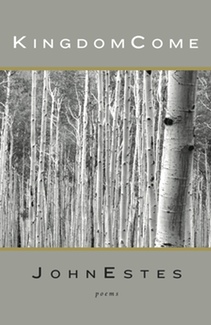
|
At their best, the poems of John Estes’ debut full-length collection, Kingdom Come, illustrate a magical ability to balance three, four, even five impulses simultaneously. He also displays a deft hand at narrative structure throughout the book. In fact, Kingdom Come embraces the arc of modern suburban male identity in the late twentieth/early twenty-first century as its overall narrative. And Estes unspools the complexities of his theme in carefully rendered stages (section titles include “IN WHICH he marries” and “IN WHICH a child is conceived and born”). What begins as an inventory of books and, more subconsciously, a travelogue as metaphor for domesticity and marriage, eventually eases into a cataloguing of the more prescient cost of current events: Estes, in subdued tones that speak to the bottom line we’re often overlooking in the fine print of our lives, in lines too shocked to consider tools like enjambment, so effortlessly (and refreshingly) shows us the fluidity between the self and the world, the current events of the heart and the current events of the headlines, what Whitman liked to call the “me” and “not me.” A poem in Sioux Falls, itself once saved In these and other poems, you get a sense of Estes’ humor, which also manifests itself in the kind of self-deprecating tones usually reserved for 30-second spots at halftime of the football game: “Standing at the center urinal,” one poem begins, “waiting on the urine….” But more importantly, he uses humor as vehicle into male consciousness, and not just as the context in which important life events occur. Consider these lines from “Birth Class”: If there’s a flaw to the book, however, it resides in Estes not obeying the less-is-more principle. At 58 poems split into 5 sections over 111 pages, with over 20 epigraphs spaced in between, some trimming would provide room for the high moments of Kingdom Come to ripen in the reader’s imagination. --Jay Robinson Jay Robinson is Co-Editor-in-Chief / Reviews Editor of Barn Owl Review. His poems have appeared or are forthcoming in 32 Poems, Anti-, The Laurel Review, The North American Review, and Whiskey Island, among others.
|
